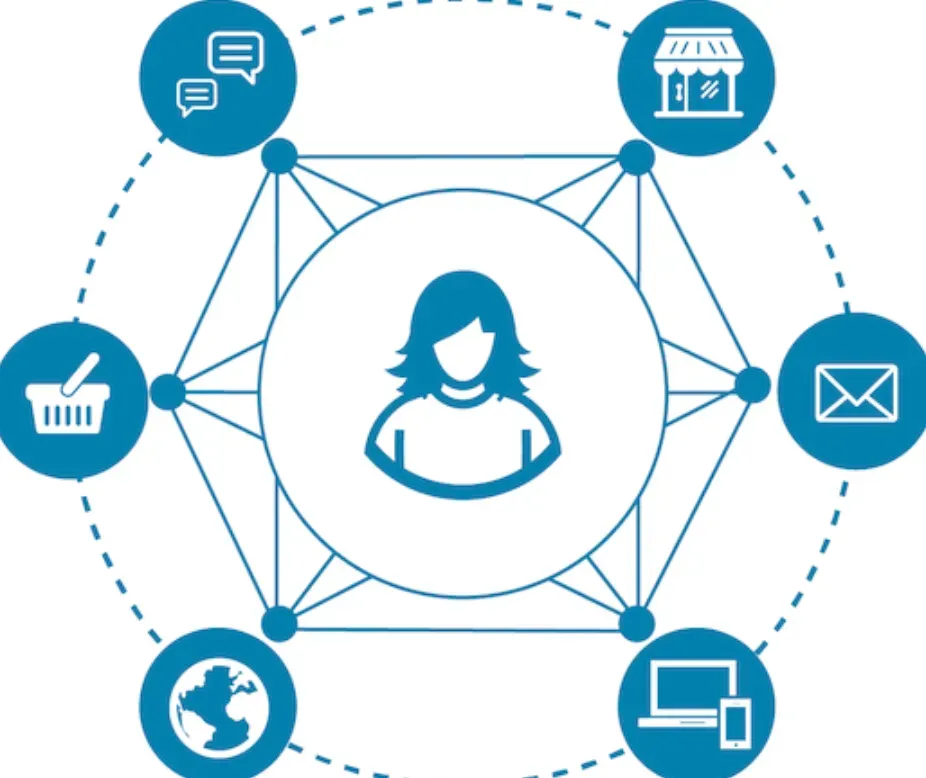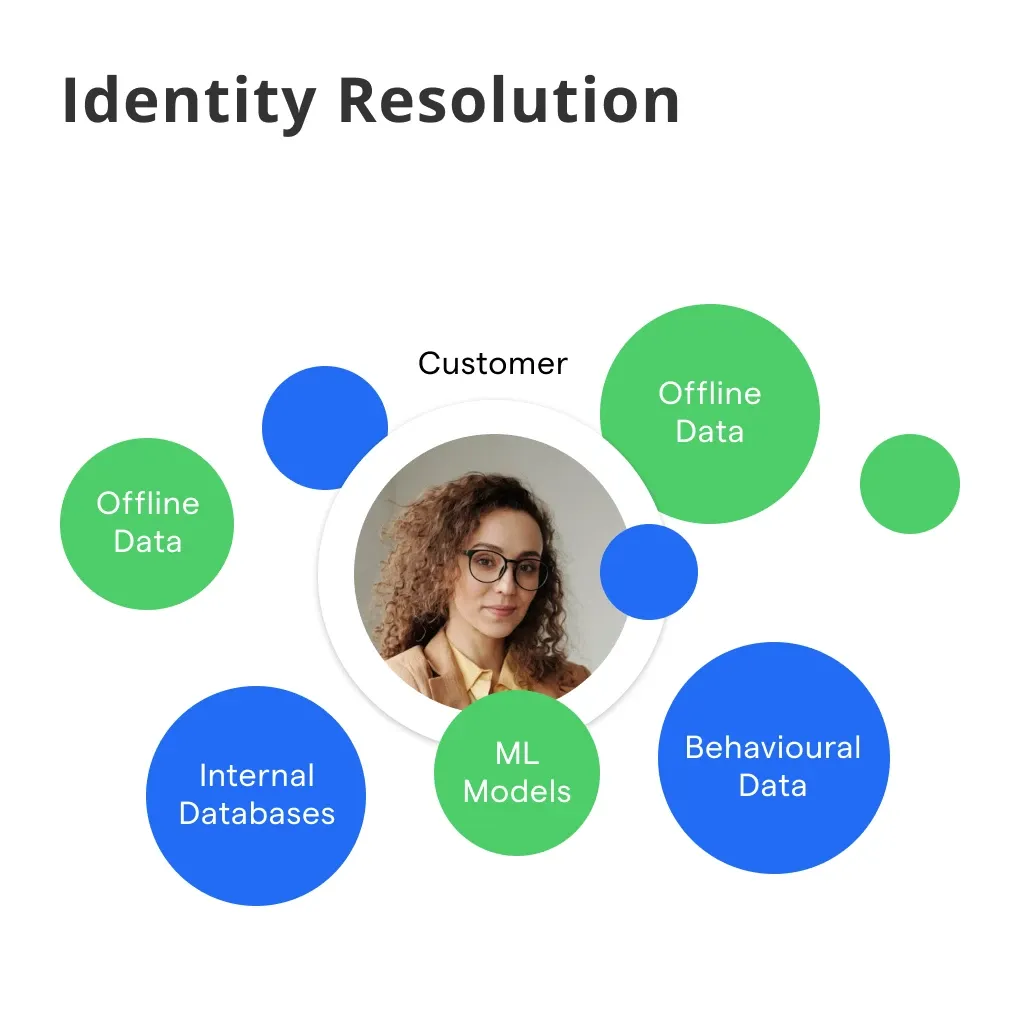What is Identity Resolution?
At its core, identity resolution is about connecting the dots. In a digital environment where a single person can have multiple profiles across various platforms, how do we recognize them as the same entity?
Understanding the Basics
Identity resolution is the process of matching identifiers collected from customer engagements to build a unified, consistent, and accurate representation of an individual. It's like recognizing that the John Doe who clicked on your ad from his smartphone in the morning is the same John Doe who made a purchase on your website through his laptop at night.
The Role of Data
Data plays a critical role in this process. By collecting and analyzing data points, or signals, from various sources, businesses can create a more complete picture of their customers.
Technology and Tools
Various technologies and tools are deployed for identity resolution, including customer data platforms (CDPs), data management platforms (DMPs), and identity graphs.
Privacy Considerations
With great power comes great responsibility. Navigating the thin line between personalization and privacy is crucial in identity resolution.
Benefits for Businesses and Customers
For businesses, identity resolution enables more targeted and effective marketing. For customers, it means more personalized and convenient experiences.
Why is Identity Resolution Important?
Why bother with all this? Because in the digital age, understanding your customers is the key to engaging with them effectively.
Personalization
The more you know about your customers, the more personalized and relevant your interactions can be.
Efficiency and ROI
Targeted marketing isn't just nice for the customer—it's also more efficient and offers a better return on investment for businesses.
Omnichannel Experience
In a world where customers interact with brands across multiple channels, providing a seamless experience is paramount.
Compliance and Privacy
Identity resolution can help businesses comply with privacy regulations by ensuring that they're correctly identifying individuals.
Competitive Edge
In the digital arms race, having a sophisticated identity resolution strategy can give businesses a significant competitive advantage.
How Does Identity Resolution Work?
Pulling off effective identity resolution is a bit like being a detective. It requires gathering clues, piecing together a puzzle, and arriving at a conclusion.
Data Collection
The first step is collecting data from various touchpoints and sources.
Data Matching
Next, this data is matched and linked together using deterministic or probabilistic methods.
Identity Graphs
An identity graph is created, which is essentially a database that maps all the known identifiers to individual customer profiles.
Continuous Learning
Identity resolution isn't a one-and-done process. It requires continuous data ingestion and learning to refine the accuracy of the identity graph.
Integration with Marketing Systems
Finally, the insights from the identity resolution process are integrated with marketing systems to enable personalized customer engagement.
When is Identity Resolution Used?
Identifying where and when identity resolution comes into play can help businesses better integrate it into their strategies.

Omnichannel Marketing
Whenever a business wants to engage with customers across multiple channels seamlessly.
Customer Journey Mapping
Understanding the various touchpoints a customer has with your brand over time.
Targeted Advertising
Delivering personalized ads requires a deep understanding of who the customer is.
Personalized Content and Recommendations
Creating content or product recommendations that resonate with the individual.
Fraud Detection
By understanding the normal behavior of a verified customer, businesses can more easily spot anomalies that suggest fraud.
Who Benefits from Identity Resolution?
It's not just big tech companies or marketers who are getting in on the identity resolution game. Its beneficiaries are quite diverse.
Marketers
Clearly, marketers stand to gain a lot from understanding their audience better.
Sales Teams
Sales teams can use identity resolution insights to better understand and connect with potential leads.
Customer Service
Offering more personalized service is always a win, and identity resolution can help customer service reps achieve that.
Consumers
At the end of the day, consumers benefit from more relevant, personalized experiences and improved privacy.
Regulators and Watchdogs
Effective identity resolution can help businesses comply with regulations, making the digital space safer for everyone.
Challenges in Identity Resolution
Despite its clear benefits, identity resolution is not without its pitfalls and challenges.

Data Accuracy
Garbage in, garbage out. Ensuring data accuracy is a constant challenge.
Privacy Regulations
Navigating the complex web of global privacy laws requires diligence and understanding.
Data Fragmentation
With data coming from multiple sources, fragmentation can be a significant barrier to achieving a unified view.
Device and Platform Proliferation
The ever-increasing number of devices and platforms complicates the identity resolution process.
Adapting to Changes
The digital landscape is continually evolving, requiring businesses to be nimble in their identity resolution strategies.
Best Practices in Identity Resolution
To navigate the challenges and make the most of identity resolution, there are several best practices businesses can follow.
Prioritize Privacy
Always ensure that your identity resolution practices comply with relevant privacy laws and respect customer preferences.
Use a Combination of Approaches
Don't rely solely on deterministic or probabilistic matching. A hybrid approach usually yields better results.
Keep Data Clean and Updated
Regularly clean and update your databases to maintain the accuracy of your customer profiles.
Invest in Quality Technology
Utilize robust tools and platforms that are capable of sophisticated identity resolution.
Foster Cross-Department Collaboration
Ensure that marketing, sales, customer service, and IT departments work together in your identity resolution efforts.
Emerging Trends in Identity Resolution
The field of identity resolution is dynamic, with new trends constantly emerging as technology evolves.

AI and Machine Learning
These technologies are increasingly being used to improve the accuracy and efficiency of identity resolution processes.
Blockchain for Identity
Some innovators are exploring the use of blockchain technology to create more secure and immutable identity resolutions.
Focus on Consumer-Controlled Identities
There's a growing trend towards giving consumers more control over their digital identities.
Increasing Importance of First-Party Data
With privacy regulations tightening, the value of first-party data, which is directly collected from your customers, is on the rise.
Identity Resolution as a Service (IRaaS)
Expect to see more companies offering identity resolution as a cloud-based service, making it accessible to more businesses.
it's evident that whilst the concept is complex and fraught with challenges, its importance in the digital marketing ecosystem is undeniable.
By adopting best practices and staying abreast of emerging trends, businesses can navigate these waters successfully, leading to more meaningful and personalized engagement with their customers.
Remember, at its heart, identity resolution is about understanding and respecting the customer's journey, and that's a goal worth striving for.
Frequently Asked Questions (FAQs)
How Does Identity Resolution Enhance Customer Experience?
Identity Resolution consolidates fragmented customer data from various sources, providing a unified view. This enables personalized marketing and improved customer service.
What is Identity Resolution and can it help in Reducing Fraud?
Identity resolution is the process of identifying and linking different pieces of data that refer to the same entity.
This is important in tasks like customer relationship management and online advertising.
Yes, by accurately identifying and linking customer identities, it helps in spotting discrepancies and potentially fraudulent activities more effectively.
What Role Does Machine Learning Play in Identity Resolution?
Machine Learning algorithms analyze vast amounts of data to find patterns and connections, improving the accuracy and efficiency of identity matching over time.
In What Ways is Identity Resolution Critical for Omnichannel Marketing?
It ensures consistent, personalized customer interactions across all channels by accurately identifying customers, regardless of how they engage with a brand.
How Does Identity Resolution Navigate Data Privacy Regulations?
By implementing stringent data governance and ensuring compliance with regulations like GDPR, identity resolution practices must protect consumer privacy while providing insights.

